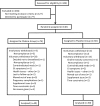Phosphatidylcholine supplementation in pregnant women consuming moderate-choline diets does not enhance infant cognitive function: a randomized, double-blind, placebo-controlled trial
- PMID: 23134891
- PMCID: PMC3497930
- DOI: 10.3945/ajcn.112.037184
Phosphatidylcholine supplementation in pregnant women consuming moderate-choline diets does not enhance infant cognitive function: a randomized, double-blind, placebo-controlled trial
Abstract
Background: Choline is essential for fetal brain development, and it is not known whether a typical American diet contains enough choline to ensure optimal brain development.
Objective: The study was undertaken to determine whether supplementing pregnant women with phosphatidylcholine (the main dietary source of choline) improves the cognitive abilities of their offspring.
Design: In a double-blind, randomized controlled trial, 140 pregnant women were randomly assigned to receive supplemental phosphatidylcholine (750 mg) or a placebo (corn oil) from 18 wk gestation through 90 d postpartum. Their infants (n = 99) were tested for short-term visuospatial memory, long-term episodic memory, language development, and global development at 10 and 12 mo of age.
Results: The women studied ate diets that delivered ∼360 mg choline/d in foods (∼80% of the recommended intake for pregnant women, 65% of the recommended intake for lactating women). The phosphatidylcholine supplements were well tolerated. Groups did not differ significantly in global development, language development, short-term visuospatial memory, or long-term episodic memory.
Conclusions: Phosphatidylcholine supplementation of pregnant women eating diets containing moderate amounts of choline did not enhance their infants' brain function. It is possible that a longer follow-up period would reveal late-emerging effects. Moreover, future studies should determine whether supplementing mothers eating diets much lower in choline content, such as those consumed in several low-income countries, would enhance infant brain development.
Trial registration: ClinicalTrials.gov NCT00678925.
Figures
References
-
- Sweiry JH, Page KR, Dacke CG, Abramovich DR, Yudilevich DL. Evidence of saturable uptake mechanisms at maternal and fetal sides of the perfused human placenta by rapid paired-tracer dilution: studies with calcium and choline. J Dev Physiol 1986;8:435–45 - PubMed
-
- Ozarda Ilcol Y, Uncu G, Ulus IH. Free and phospholipid-bound choline concentrations in serum during pregnancy, after delivery and in newborns. Arch Physiol Biochem 2002;110:393–9 - PubMed
Publication types
MeSH terms
Substances
Associated data
Grants and funding
LinkOut - more resources
Full Text Sources
Medical
Research Materials


